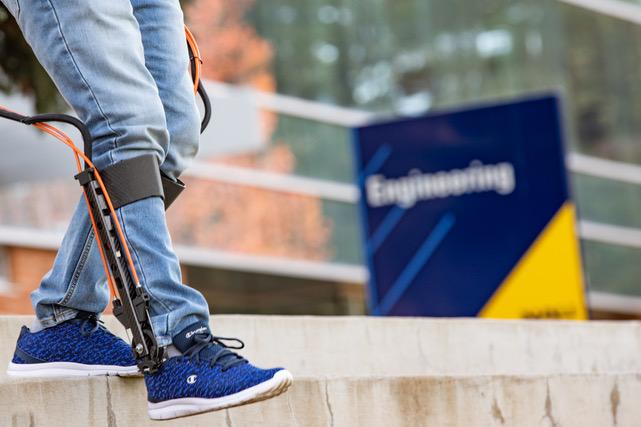Project outcomes have potential to transform treatment of walking disabilities across wide range of conditions
Zach Lerner, an assistant professor in Northern Arizona University’s Department of Mechanical Engineering, was recently awarded a $538,563 grant from the National Science Foundation (NSF) to build on his research into restoring neuromuscular function and augmenting human ability through the design, control and testing of robotic exoskeletons.
“There is a critical need for treatments that address the root causes of walking disability, including impaired strength, muscle control and coordination. This project seeks to advance the scientific study of walking rehabilitation and pioneer a novel wearable rehabilitation strategy,” Lerner said. “The outcomes of this project have the potential to transform the treatment of walking disabilities across a wide range of conditions.”
Grant is NSF’s most prestigious award in support of junior faculty
The award was made to Lerner by the NSF through its Faculty Early Career Development (CAREER) Program, a foundation-wide activity that offers the NSF’s most prestigious awards “in support of early-career faculty who have the potential to serve as academic role models in research and education and to lead advances in the mission of their department or organization. Activities pursued by early-career faculty should build a firm foundation for a lifetime of leadership in integrating education and research.”
The funding will support Lerner’s goal to optimize long-term gait rehabilitation through hybrid ankle exoskeleton training, working with a team that includes both graduate and undergraduate students in his Biomechatronics Lab on NAU’s Flagstaff campus.
While wearable robotic exoskeletons hold potential for individuals with walking disabilities, prior research has focused on immediate improvements in walking performance from powered assistance. This project seeks to understand whether alternating assistance and resistance with a wearable ankle exoskeleton will elicit greater improvements in walking than either approach alone.
“This funding will support us in establishing fundamental knowledge on the interplay between disease severity and wearable assistance and resistance,” Lerner said. “The strategies we develop will be generalizable, enabling other investigators to apply this framework to different types of control algorithms, devices, joints and patient populations.”
Project to integrate research and education
The five-year project will also enable Lerner and his team to offer opportunities for educational and outreach activities to engage elementary and middle school students as well as college students. Lerner will develop a new Curriculum in Assistive Robotics and Engineering (CARE), incorporating advanced robotics course modules, design-for-disability capstone projects and K-12 experiences.
“Through this new curriculum,” Lerner said, “we aim to motivate engineering students to address the challenges experienced by individuals with disabilities and improve engineering education on human-centered design. We anticipate that the students involved in CARE will gain an improved understanding of the needs of people with physical disabilities, which will translate into effective engineering solutions, and result in more motivated, insightful and impactful engineering students and professionals.”
###
About Northern Arizona University
Northern Arizona University is a higher-research institution providing exceptional educational opportunities in Arizona and beyond. NAU delivers a student-centered experience to its nearly 30,000 students in Flagstaff, statewide and online through rigorous academic programs in a supportive, inclusive and diverse environment. Dedicated, world-renowned faculty help ensure students achieve academic excellence, experience personal growth, have meaningful research opportunities and are positioned for personal and professional success.
Media Contact
Zach Lerner
[email protected]
Original Source
https:/





